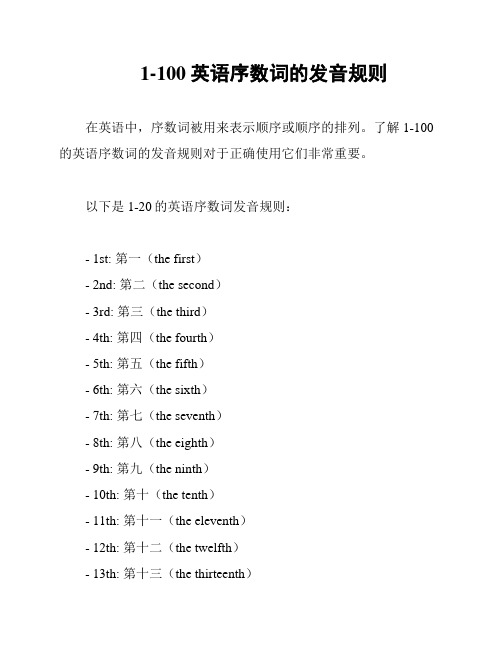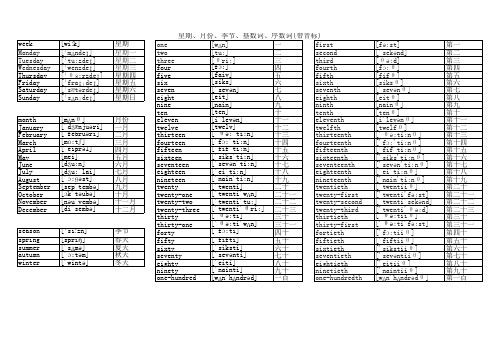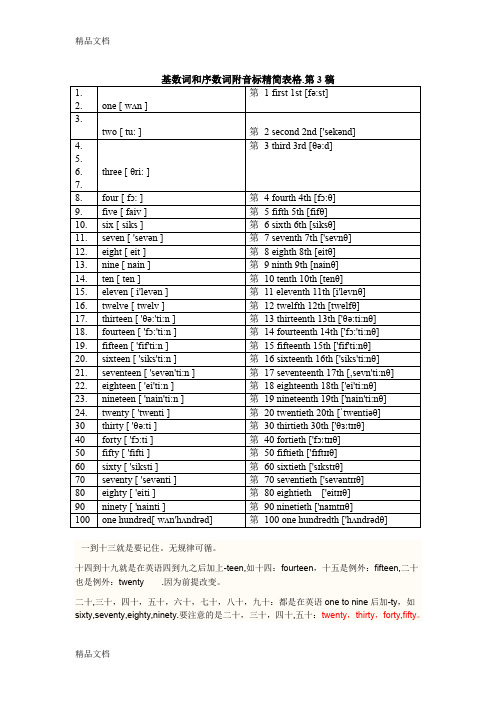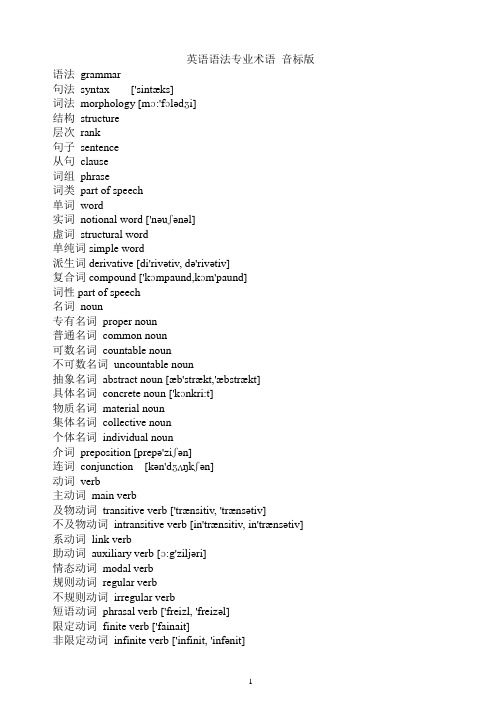英语序数词 音标
从1到100的英语基数词和序数词附音标规律巧记法汇编

1.
2.喜欢□一般□不喜欢□
one [ wʌn ]
1、作者:蒋志华《市场调查与预测》,中国统计出版社2002年8月§11-2市场调查分析书面报告第1 first 1st [fə:st]
3.
根本不知道□two [ tu: ]
但这些困难并非能够否定我们创业项目的可行性。盖茨是由一个普通退学学生变成了世界首富,李嘉诚是由一个穷人变成了华人富豪第一人,他们的成功表述一个简单的道理:如果你有能力,你可以从身无分文变成超级富豪;如果你无能,你也可以从超级富豪变成穷光蛋。
500元以上1224%(3)年龄优势第2 second 2nd ['sekənd]
4.
5.(一)对“漂亮女生”饰品店的分析
综上所述,DIY手工艺品市场致所以受到认可、欢迎的原因就在于此。我们认为:这一市场的消费需求的容量是极大的,具有很大的发展潜力,我们的这一创业项目具有成功的前提。
调研提纲:three [ θri: ]
14.
twelve [ twelv ]
第12 twelfth 12th [twelfθ]
15.
thirteen [ 'θə:'ti:n ]
第13 thirteenth 13th ['θə:ti:nθ]
16.
fourteen [ 'fɔ:'ti:n ]
第14 fourteenth 14th ['fɔ:'ti:nθ]
20.
eighteen [ 'ei'ti:n ]
第18 eighteenth 18th ['ei'ti:nθ]
21.
1-100英语序数词的发音规则

1-100英语序数词的发音规则在英语中,序数词被用来表示顺序或顺序的排列。
了解1-100的英语序数词的发音规则对于正确使用它们非常重要。
以下是1-20的英语序数词发音规则:- 1st: 第一(the first)- 2nd: 第二(the second)- 3rd: 第三(the third)- 4th: 第四(the fourth)- 5th: 第五(the fifth)- 6th: 第六(the sixth)- 7th: 第七(the seventh)- 8th: 第八(the eighth)- 9th: 第九(the ninth)- 10th: 第十(the tenth)- 11th: 第十一(the eleventh)- 12th: 第十二(the twelfth)- 13th: 第十三(the thirteenth)- 14th: 第十四(the fourteenth)- 15th: 第十五(the fifteenth)- 16th: 第十六(the sixteenth)- 17th: 第十七(the seventeenth)- 18th: 第十八(the eighteenth)- 19th: 第十九(the nineteenth)- 20th: 第二十(the twentieth)从21到99的英语序数词的发音规则则是将基数词(cardinal number)直接加上-th,例如:- 21st: 第二十一(the twenty-first)- 22nd: 第二十二(the twenty-second)- 23rd: 第二十三(the twenty-third)- ...- 30th: 第三十(the thirtieth)- ...- 40th: 第四十(the fortieth)- ...- 50th: 第五十(the fiftieth)- ...- 90th: 第九十(the ninetieth)- 99th: 第九十九(the ninety-ninth)对于100以及以上的英语序数词,我们使用-hundred和其后的序数词结合,例如:- 100th: 第一百(the hundredth)- 101st: 第一百零一(the hundred and first)- 200th: 第二百(the two hundredth)- 300th: 第三百(the three hundredth)- ...- 1000th: 第一千(the thousandth)- ...- th: 第一万(the ten thousandth)- ...通过掌握这些发音规则,你将能够正确地使用1-100的英语序数词。
苏教版五年级下册英语课文和单词

苏教版五年级下册英语课文和单词- unit 1.- twelfth.- 音标:英 [twelfθ] 美 [twelfθ]。
- 词性:序数词。
- 出处:人教版五年级下册英语教材Unit 1。
- 解释:第十二。
- 造句:Today is the twelfth day of this month.(今天是这个月的第十二天。
)。
- 近义词:无。
- 反义词:无。
- twentieth.- 音标:英 [ˈtwentɪəθ] 美 [ˈtwentɪəθ]。
- 词性:序数词。
- 出处:人教版五年级下册英语教材Unit 1。
- 解释:第二十。
- 造句:This is the twentieth time I've told you to clean your room.(这是我第二十次叫你打扫房间了。
)。
- 近义词:无。
- 反义词:无。
- unit 2.- spring.- 音标:英 [sprɪŋ] 美 [sprɪŋ]。
- 词性:名词。
- 出处:人教版五年级下册英语教材Unit 2。
- 解释:春天。
- 造句:Spring is a beautiful season.(春天是一个美丽的季节。
)。
- 近义词:无。
- 反义词:autumn(秋天)。
- summer.- 音标:英 [ˈsʌmə(r)] 美 [ˈsʌmər]。
- 词性:名词。
- 出处:人教版五年级下册英语教材Unit 2。
- 解释:夏天。
- 造句:I like swimming in summer.(我喜欢在夏天游泳。
)。
- 近义词:无。
- 反义词:winter(冬天)。
课文(以部分为例)。
- Unit 1 My day.- A Let's talk.- 原文:Zhang Peng: When do you finish class in the morning?Pedro: We finish class at 1 o'clock. Then we eat lunch at home. Zhang Peng: Wow! When do you go back to school after lunch? Pedro: At 2:30. Classes start at 3 o'clock.Zhang Peng: What do you usually do on the weekend?Pedro: I often play football. Sometimes I go shopping with my mum. - 译文:张鹏:你们上午什么时候下课?佩德罗:我们一点钟下课。
星期-月份-季节-基数词-序数词(带音标)

月份 一月 二月 三月 四月 五月 六月 七月 八月 九月 十月 十一月 十二月
season
spring summer autumn winter
[ˈsiːzn]
[spriŋ] ['sʌmə] ['ɔ:təm] ['wintə]
季节
春天 夏天 秋天 冬天
星期、月份、季节、基数词、序数词(带音标)
one
[tu:] [θri:] [fɔ:] [faiv] [siks] ['sevən] [eit] [nain] [ten] [i'levən] [twelv] ['θə:'ti:n] ['fɔ:'ti:n] ['fif'ti:n] ['siks'ti:n] ['sevən'ti:n] ['ei'ti:n] ['nain'ti:n] ['twenti] ['twenti'wʌn] ['twenti'tu:] ['twenti'θri:] ['θə:ti] ['θə:ti'wʌn]
[wʌn]
一
first
two three four five six seven eight nine ten eleven twelve thirteen fourteen fifteen sixteen seventeen eighteen nineteen twenty twenty-one twenty-two twenty-three thirty thirty-one
week
Monday Tuesday Wednesday Thursday Friday Saturday Sunday
最新从1到100的英语基数词和序数词附音标规律巧记法

eighteen [ 'ei'ti:n ]
第18 eighteenth 18th ['ei'ti:nθ]
23.
nineteen [ 'nain'ti:n ]
第19 nineteenth 19th ['nain'ti:nθ]
24.
twenty [ 'twenti ]
第20 twentieth 20th [ˈtwentiəθ]
第100 one hundredth ['hʌndrədθ]
一到十三就是要记住。无规律可循。
十四到十九就是在英语四到九之后加上-teen,如十四:fourteen,十五是例外:fifteen,二十也是例外:twenty .因为前提改变。
二十,三十,四十,五十,六十,七十,八十,九十:都是在英语one to nine后加-ty,如sixty,seventy,eighty,ninety.要注意的是二十,三十,四十,五十:twenty,thirty,forty,fifty。
30
thirty [ 'θə:ti ]
第30 thirtieth 30th ['θɜːtɪɪθ]
40
forty [ 'fɔ:ti ]
第40 fortieth ['fɔːtɪɪθ]
50
fifty [ 'fifti ]
第50 fiftieth ['fɪftɪɪθ]
60
sixty [ 'siksti ]
第60 sixtieth ['sɪkstɪθ]
第3 third 3rd [θə:d]
8.
four [ fɔ: ]
英语语法专业术语 音标版

英语语法专业术语音标版语法grammar句法syntax ['sintæks]词法morphology [mɔ:'fɔlədʒi]结构structure层次rank句子sentence从句clause词组phrase词类part of speech单词word实词notional word ['nəuʃənəl]虚词structural word单纯词simple word派生词derivative [di'rivətiv, də'rivətiv]复合词compound ['kɔmpaund,kɔm'paund]词性part of speech名词noun专有名词proper noun普通名词common noun可数名词countable noun不可数名词uncountable noun抽象名词abstract noun [æb'strækt,'æbstrækt]具体名词concrete noun ['kɔnkri:t]物质名词material noun集体名词collective noun个体名词individual noun介词preposition [prepə'ziʃən]连词conjunction [kən'dʒʌŋkʃən]动词verb主动词main verb及物动词transitive verb ['trænsitiv, 'trænsətiv]不及物动词intransitive verb [in'trænsitiv, in'trænsətiv] 系动词link verb助动词auxiliary verb [ɔ:g'ziljəri]情态动词modal verb规则动词regular verb不规则动词irregular verb短语动词phrasal verb ['freizl, 'freizəl]限定动词finite verb ['fainait]非限定动词infinite verb ['infinit, 'infənit]使役动词causative verb ['kɔ:zətiv]感官动词verb of senses动态动词event verb静态动词state verb感叹词exclamation [.eksklə'meiʃən]形容词adjective副词adverb方式副词adverb of manner程度副词adverb of degree时间副词adverb of time地点副词adverb of place修饰性副词adjunct连接性副词conjunct疑问副词interrogative adverb [.intə'rɔgətiv]关系副词relative adverb代词pronoun ['prəunaun]人称代词personal pronoun物主代词possessive pronoun [pə'zesiv]反身代词reflexive pronoun [ri'fleksiv]相互代词reciprocal pronoun [ri'siprəkəl]指示代词demonstrative pronoun [di'mɔnstrətiv]疑问代词interrogative pronoun [.intə'rɔgətiv]关系代词relative pronoun不定代词indefinite pronoun [in'definit, in'defənit]名词性物主代词nominal possessive pronoun形容词性物主代词adjectival possessive pronoun [.ædʒik'taivəl] 冠词article定冠词definite article ['definit, 'defənit]不定冠词indefinite article数词numeral ['nju:mərəl]基数词cardinal numeral ['kɑ:dinl, 'kɑ:dnəl]序数词ordinal numeral ['ɔ:dinəl, 'ɔ:dnəl]分数词fractional numeral ['frækʃənəl]形式form单数形式singular form复数形式plural form ['pluərəl, 'plurəl]限定动词finite verb form ['fainait]非限定动词non-finite verb form [nʌn'finit]原形base form从句clause从属句subordinate clause [sə'bɔ:dineit, sə'bɔ:dn.eit,sə'bɔ:dnit]并列句coordinate clause [kəu'ɔ:dneit,kəu'ɔ:dnit, kəu'ɔ:dəneit]名词从句nominal clause ['nɔminəl, 'nɔmənəl]定语从句attributive clause [ə'tribjutiv, ə'tribjətiv]状语从句adverbial clause [əd'və:biəl]宾语从句object clause主语从句subject clause同位语从句appositive clause [ə'pɔzitiv]时间状语从句adverbial clause of time地点状语从句adverbial clause of place方式状语从句adverbial clause of manner让步状语从句adverbial clause of concession [kən'seʃən]原因状语从句adverbial clause of cause结果状语从句adverbial clause of result目的状语从句adverbial clause of purpose条件状语从句adverbial clause of condition真实条件状语从句adverbial clause of real condition非真实条件状语从句adverbial clause of unreal condition含蓄条件句adverbial clause of implied condition错综条件句adverbial clause of mixed condition句子sentence简单句simple sentence并列句compound sentence复合句complex sentence并列复合句compound complex sentence陈述句declarative sentence [di'klærətiv]疑问句interrogative sentence [.intə'rɔgətiv]一般疑问句general question特殊疑问句special question选择疑问句alternative question [ɔ:l'tə:nətiv]附加疑问句tag question反义疑问句disjunctive question [dis'dʒʌŋktiv]修辞疑问句rhetorical question [ri'tɔrikəl]感叹疑问句exclamatory question [iks'klæmə.təri, ik'sklæmə.təuri] 存在句existential sentence [.egzis'tenʃəl]肯定句positive sentence基本句型basic sentence pattern否定句negative sentence祈使句imperative sentence [im'perətiv]省略句elliptical sentence [i'liptikəl]感叹句exclamatory sentence [iks'klæmə.təri, ik'sklæmə.təuri]句子成分members of sentences主语subject谓语predicate ['predikeit,'predikit]宾语object双宾语dual object ['dju:əl]直接宾语direct object间接宾语indirect object复合宾语complex object同源宾语cognate object ['kɔg.neit]补语complement ['kɔmplimənt, 'kɔmplə.ment,'kɔmpləmənt] 主补subject complement宾补object complement表语predicative ['pridi.kətiv, 'predi.keitiv]定语attribute [ə'tribju:t,'ætribju:t, ə'tribjut,'ætrə.bju:t]同位语appositive [ə'pɔzitiv]状语adverbial [əd'və:biəl]句法关系syntactic relationship [sin'tæktik]并列coordinate [kəu'ɔ:dneit,kəu'ɔ:dnit, kəu'ɔ:dəneit]从属subordination [səb.ɔ:di'neiʃən, səb.ɔ:dən'eiʃən]修饰modification [.mɔdifi'keiʃən, .mɔdəfə'keiʃən]前置修饰pre-modification [.mɔdifi'keiʃən, .mɔdəfə'keiʃən] 后置修饰post-modification [.mɔdifi'keiʃən, .mɔdəfə'keiʃən] 限制restriction [ri'strikʃən]双重限制double-restriction非限制non-restriction数number单数形式singular form复数形式plural form规则形式regular form不规则形式irregular form格case普通格common case所有格possessive case主格nominative case宾格objective case [əb'dʒektiv]性gender ['dʒendə]阳性masculine ['mæskjulin, 'mæskjəlin]阴性feminine ['feminin, 'femənin]通性common中性neuter ['nju:tə]人称person第一人称first person第二人称second person第三人称third person时态tense过去将来时past future tense过去将来进行时past future continuous tense过去将来完成时past future perfect tense一般现在时present simple tense一般过去时past simple tense一般将来时future simple tense现在完成时past perfect tense过去完成时present perfect tense将来完成时future perfect tense现在进行时present continuous tense过去进行时past continuous tense将来进行时future continuous tense过去将来进行时past future continuous tense现在完成进行时present perfect continuous tense过去完成进行时past perfect continuous tense语态voice主动语态active voice被动语态passive voice语气mood陈述语气indicative mood [in'dikətiv]祈使语气imperative mood [im'perətiv]虚拟语气subjunctive mood [səb'dʒʌŋktiv]否定negation [ni'geiʃən]否定范围scope of negation [skəup]全部否定full negation局部否定partial negation ['pɑ:ʃəl]转移否定shift of negation语序order自然语序natural order倒装语序inversion [in'və:ʃən]全部倒装full inversion部分倒装partial inversion直接引语direct speech间接引语indirect speech自由直接引语free direct speech自由间接引语free indirect speech一致agreement主谓一致subject-predicate agreement ['predikeit,'predikit]语法一致grammatical agreement [grə'mætikəl]概念一致notional agreement ['nəuʃənəl]就近原则principle of proximity [prɔk'simiti, prɔk'siməti] 强调emphasis ['emfəsis]emphasize ['emfəsaiz, 'emfə.saiz]重复repetition [.repi'tiʃən]语音pronunciation语调tone升调rising tone降调falling tone降升调falling-rising tone文体style正式文体formal非正式文体informal口语spoken/oral English套语formulistic expression [fɔ:mju'listik]英国英语British English美国英语American English用法usage感情色彩emotional coloring ['kʌləriŋ]褒义commendatory [kə'mendətəri, kə'mendə.təuri]贬义derogatory [di'rɔgətəri, di'rɔgə.təuri]幽默humorous ['hju:mərəs]讽刺sarcastic [sɑ:'kæstik]挖苦ironic [ai'rɔnik]。
一到十英文音标
一到十英文音标
一到十的数字英语音标如下:
1.one 英 [wʌn] 美 [wʌn] n. 一;一个;一体
2.two 英 [tuː] 美 [tuː] num. 二;两个
3.three 英[θriː] 美[θriː] num. 三;n. 三;三个
4.four 英 [fɔː(r)] 美 [fɔːr] num. 四
5.five 英 [faɪv] 美 [faɪv] num. 五
6.six 英 [sɪks] 美 [sɪks] num. 六
7.seven英 ['sevn] 美 ['sevn] num. 七
8.eight 英 [eɪt] 美 [eɪt] num. 八;n. 八人划船队
9.nine 英 [naɪn] 美 [naɪn] num. 九
10.ten 英 [ten] 美 [ten] num. 十
扩展资料:
对应的序数词
first 第一
second 第二
third 第三
fourth 第四
fifth 第五
sixth 第六
seventh 第七
eighth 第八
ninth 第九
tenth 第十
变换记法口诀:
基变序,有规律,词尾加上-th.
一,二,三,特殊记,词尾字母t,d,d.
八去t,九除e,ve要用f替,ty将y变成i,th前面有个e.
若是碰到几十几,前用基来后用序.
整十基数变序数,先把ty变成tie,要是遇上2位数,十位基数,个位序,th最后加上去.。
1到31的序数词英文读法
1到31的序数词英文读法The English language has a unique system for expressing ordinal numbers, which are used to indicate the position or rank of an item in a sequence. From the first to the thirty-first, the ordinal numbersin English have their own distinct pronunciations that can be challenging for non-native speakers to master. Understanding the patterns and irregularities in the pronunciation of these ordinal numbers is an important aspect of developing fluency in the English language.Starting with the most basic ordinal number, "first" is pronounced as /fɜːrst/. This is a common ordinal number that is used to describe the initial item in a sequence. The "ir" sound in "first" can be tricky for some learners, as it is a sound that does not exist in many other languages.Moving on, the ordinal number "second" is pronounced as /ˈsekənd/. This is a straightforward ordinal number, with the stress falling on the first syllable. The "c" sound in "second" is pronounced as a "k" sound, which is consistent with the pronunciation of the root wordThe ordinal number "third" is pronounced as /θɜːrd/. This is an irregular ordinal number, as the "th" sound is not present in the root word "three." The "ir" sound in "third" is also similar to the "ir" sound in "first," which can be challenging for some learners.The ordinal number "fourth" is pronounced as /fɔːrθ/. This is another irregular ordinal number, as the "th" sound is not present in the root word "four." The "or" sound in "fourth" can also be tricky for some learners, as it is a diphthong that is not present in all languages.The ordinal number "fifth" is pronounced as /fɪfθ/. This is a straightforward ordinal number, with the stress falling on the first syllable. The "th" sound in "fifth" is consistent with the root word "five."The ordinal number "sixth" is pronounced as /sɪksθ/. This is another straightforward ordinal number, with the stress falling on the first syllable. The "th" sound in "sixth" is consistent with the root word "six."The ordinal number "seventh" is pronounced as /ˈsevənθ/. This is a more complex ordinal number, as the "th" sound is not present in the root word "seven." The stress in "seventh" falls on the firstThe ordinal number "eighth" is pronounced as /ˈeɪtθ/. This is an irregular ordinal number, as the "th" sound is not present in the root word "eight." The stress in "eighth" falls on the first syllable.The ordinal number "ninth" is pronounced as /naɪnθ/. This is a straightforward ordinal number, with the stress falling on the first syllable. The "th" sound in "ninth" is consistent with the root word "nine."The ordinal number "tenth" is pronounced as /tenθ/. This is a straightforward ordinal number, with the stress falling on the first syllable. The "th" sound in "tenth" is consistent with the root word "ten."The ordinal number "eleventh" is pronounced as /ɪˈlevənθ/. This is a more complex ordinal number, as the "th" sound is not present in the root word "eleven." The stress in "eleventh" falls on the second syllable.The ordinal number "twelfth" is pronounced as /twelfθ/. This is an irregular ordinal number, as the "th" sound is not present in the root word "twelve." The stress in "twelfth" falls on the first syllable.is a more complex ordinal number, as the "th" sound is not present in the root word "thirteen." The stress in "thirteenth" falls on the second syllable.The ordinal number "fourteenth" is pronounced as /ˌfɔːrˈtiːnθ/. This is a more complex ordinal number, as the "th" sound is not present in the root word "fourteen." The stress in "fourteenth" falls on the second syllable.The ordinal number "fifteenth" is pronounced as /ˌfɪfˈtiːnθ/. This is a more complex ordinal number, as the "th" sound is not present in the root word "fifteen." The stress in "fifteenth" falls on the second syllable.The ordinal number "sixteenth" is pronounced as /ˌsɪksˈtiːnθ/. This is a more complex ordinal number, as the "th" sound is not present in the root word "sixteen." The stress in "sixteenth" falls on the second syllable.The ordinal number "seventeenth" is pronounced as /ˌsevənˈtiːnθ/. This is a more complex ordinal number, as the "th" sound is not present in the root word "seventeen." The stress in "seventeenth" falls on the second syllable.a more complex ordinal number, as the "th" sound is not present in the root word "eighteen." The stress in "eighteenth" falls on the second syllable.The ordinal number "nineteenth" is pronounced as /ˌnaɪnˈtiːnθ/. This is a more complex ordinal number, as the "th" sound is not present in the root word "nineteen." The stress in "nineteenth" falls on the second syllable.The ordinal number "twentieth" is pronounced as /ˈtwentɪəθ/. This is a more complex ordinal number, as the "th" sound is not present in the root word "twenty." The stress in "twentieth" falls on the first syllable.The ordinal number "twenty-first" is pronounced as /ˌtwentɪˈfɜːrst/. This is a more complex ordinal number, as it combines the ordinal number "first" with the cardinal number "twenty." The stress in "twenty-first" falls on the second syllable.The ordinal number "twenty-second" is pronounced as/ˌtwentɪˈsekənd/. This is a more complex ordinal number, as it combines the ordinal number "second" with the cardinal number "twenty." The stress in "twenty-second" falls on the second syllable.This is a more complex ordinal number, as it combines the ordinal number "third" with the cardinal number "twenty." The stress in "twenty-third" falls on the second syllable.The ordinal number "twenty-fourth" is pronounced as /ˌtwentɪˈfɔːrθ/. This is a more complex ordinal number, as it combines the ordinal number "fourth" with the cardinal number "twenty." The stress in "twenty-fourth" falls on the second syllable.The ordinal number "twenty-fifth" is pronounced as /ˌtwentɪˈfɪfθ/. This is a more complex ordinal number, as it combines the ordinal number "fifth" with the cardinal number "twenty." The stress in "twenty-fifth" falls on the second syllable.The ordinal number "twenty-sixth" is pronounced as /ˌtwentɪˈsɪksθ/. This is a more complex ordinal number, as it combines the ordinal number "sixth" with the cardinal number "twenty." The stress in "twenty-sixth" falls on the second syllable.The ordinal number "twenty-seventh" is pronounced as/ˌtwentɪˈsevənθ/. This is a more complex ordinal number, as it combines the ordinal number "seventh" with the cardinal number "twenty." The stress in "twenty-seventh" falls on the second syllable.This is a more complex ordinal number, as it combines the ordinal number "eighth" with the cardinal number "twenty." The stress in "twenty-eighth" falls on the second syllable.The ordinal number "twenty-ninth" is pronounced as /ˌtwentɪˈnaɪnθ/. This is a more complex ordinal number, as it combines the ordinal number "ninth" with the cardinal number "twenty." The stress in "twenty-ninth" falls on the second syllable.The ordinal number "thirtieth" is pronounced as /ˈθɜːrtiːəθ/. This is a more complex ordinal number, as the "th" sound is not present in the root word "thirty." The stress in "thirtieth" falls on the first syllable.Finally, the ordinal number "thirty-first" is pronounced as/ˌθɜːrtiˈfɜːrst/. This is the most complex ordinal number in the sequence, as it combines the ordinal number "first" with the cardinal number "thirty." The stress in "thirty-first" falls on the second syllable.In conclusion, the English language has a rich and diverse system of ordinal numbers, each with its own unique pronunciation. From the straightforward "first" to the more complex "thirty-first," mastering the pronunciation of these ordinal numbers is an important step in developing fluency in English. By understanding the patterns andirregularities in the pronunciation of these numbers, learners can improve their ability to communicate effectively in a wide range of contexts.。
新人教版高中英语数词总汇表-带音标
新人教版高中英语数词总汇表-带音标一、基数词1.1 0-10- zero /ˈziərəʊ/ 零- one /wʌn/ 一- two /tuː/ 二- three /θriː/ 三- four /fɔːr/ 四- five /faɪv/ 五- six /sɪks/ 六- seven /ˈsev.ən/ 七- eight /eɪt/ 八- nine /naɪn/ 九- ten /ten/ 十1.2 11-19- eleven /ɪˈlev.ən/ 十一- twelve /twelv/ 十二- thirteen /θɜːˈtiːn/ 十三- fourteen /ˌfɔːrˈtiːn/ 十四- fifteen /ˌfɪfˈtiːn/ 十五- sixteen /ˌsɪksˈtiːn/ 十六- seventeen /ˌsev.ənˈtiːn/ 十七- eighteen /eɪˈtiːn/ 十八- nineteen /naɪnˈtiːn/ 十九1.3 20-90- twenty /ˈtwenti/ 二十- thirty /ˈθɜːti/ 三十- forty /ˈfɔːrti/ 四十- fifty /ˈfɪfti/ 五十- sixty /ˈsɪksti/ 六十- seventy /ˈsev.ənti/ 七十- eighty /ˈeɪti/ 八十- ninety /ˈnaɪnti/ 九十1.4 100-900- one hundred /wʌn ˈhʌn.dred/ 一百- two hundred /tuː ˈhʌn.dred/ 二百- three hundred /θriː ˈhʌn.dred/ 三百- four hundred /fɔːr ˈhʌn.dred/ 四百- five hundred /faɪv ˈhʌn.dred/ 五百- six hundred /sɪks ˈhʌn.dred/ 六百- seven hundred /ˌsev.ən ˈhʌn.dred/ 七百- eight hundred /eɪt ˈhʌn.dred/ 八百- nine hundred /naɪn ˈhʌn.dred/ 九百1.5 千、万、亿- thousand /ˈθaʊ.zənd/ 千- ten thousand /ten ˈθaʊ.zənd/ 万- hundred thousand /ˌhʌn.dred ˈθaʊ.zənd/ 十万- million /ˈmɪljən/ 百万- billion /ˈbɪljən/ 十亿二、序数词2.1 1-10- first /fɜ:st/ 第一- second /ˈsek.ənd/ 第二- third /θɜ:d/ 第三- fourth /fɔ:θ/ 第四- fifth /fɪfθ/ 第五- sixth /sɪksθ/ 第六- seventh /ˈsevənθ/ 第七- eighth /eɪtθ/ 第八- ninth /nɜ:nθ/ 第九- tenth /tenθ/ 第十2.2 11-19- eleventh /ɪ'lev.ənθ/ 第十一- twelfth /twelfθ/ 第十二- thirteenth /θərˈti:θn/ 第十三- fourteenth /'fɔrˈti:θθ/ 第十四- fifteenth /ˌfɪfˈti:θn/ 第十五- sixteenth /sɪksˈti:θn/ 第十六- sev enteenth /ˌsevənˈti:θn/ 第十七- eighteenth /əˈtinθ/ 第十八- nineteenth /naɪnˈti:θn/ 第十九2.3 20-90- twentieth /ˈtwentɪəθ/ 第二十- thirtieth /ˈθɜːtiəθ/ 第三十- fortieth /ˈfɔːrtiəθ/ 第四十- fiftieth /ˈfɪftiəθ/ 第五十- sixtieth /ˈsɪkstiəθ/ 第六十- seventieth /ˈsevəntiəθ/ 第七十- eightieth /ˈeɪtiəθ/ 第八十- ninetieth /ˈnaɪntiəθ/ 第九十2.4 100-900- hundredth /ˈhʌndrədθ/ 第一百- thousandth /ˈθaʊ.zəndθ/ 第一千- millionth /ˈmɪljənθ/ 第一百万以上是新人教版高中英语数词总汇表-带音标的内容。
十二英语怎么写
十二英语怎么写十二的英语是:twelve,音标:英[twelv]美[twelv]。
十二的序数词变化不规则,需要把ve变成f再加th,twelfth,音标:英[twelftheta;]美[twelftheta;]。
例句示范:We have been gradually bled for twelve years我们被一点一滴地压榨了12年。
We were set upon by about twelve youths and I was kicked unconscious.我们遭到了大约12名青年的袭击,我被踢晕过去了。
I shall stay here until twelve o#39;clock.我将留在这里一直到十二点钟。
I met some friends and stayed out until eleven or twelve.我见了几个朋友,直到夜里十一二点才回家。
He had a tea-break about twelve.十二点左右,他放下工作休息了一下。
The building will house twelve boys and eight girls这座房子里会住12个男孩和8个女孩。
Twelve Cubans left the embassy after sheltering there for several days.12名古巴人在大使馆藏身了几天后离开了。
The year is divided into twelve months.一年分为12个月。
She is entitled to a twelfth of the cash.她有权获得这笔钱的1/12。
As usual there will be the local and regional elections on June the twelfth 照例,6月12日将会进行地方及区域选举。
The tower, incidentally, dates from the twelfth century.那座塔,顺便提一下,可以追溯到12世纪。
- 1、下载文档前请自行甄别文档内容的完整性,平台不提供额外的编辑、内容补充、找答案等附加服务。
- 2、"仅部分预览"的文档,不可在线预览部分如存在完整性等问题,可反馈申请退款(可完整预览的文档不适用该条件!)。
- 3、如文档侵犯您的权益,请联系客服反馈,我们会尽快为您处理(人工客服工作时间:9:00-18:30)。
1、
Introduce yourselves
(name 、family number、hobby、character and so on)
2
、Enlarge your vocabulary (words teaching)15min
2A.基数词与序数词的区别:
●序数词是“第…”的意思,前面都有单词the,但是如果序数词前出现不定冠词
a或an时,则表示“再...”,“又...”。
例句: We'll go over it a second time. 我们得再念第二遍。
●基数词是表示数量的词,也可以表示顺序。
只需将基数词放在它所修饰的名词之后即可,不需要添加定冠词。
the first lesson——Lesson One
2B.基数词变序数词的变化规则
(1)从第一至第十九 其中,one— first, two— second, three— third, five—
fifth,eight—eighth,nine—ninth,twelve— twelfth为特殊形式,其它的序数词都
是由其相对应的基数词后面添加“th”构成。例如: six— sixth、nineteen—
nineteenth.
(2)从第二十至第九十九 整数第几十的形式由其对应的基数词改变结尾字母y
为i,再加“eth”构成。
twenty——twentieth thirty——thirtieth
表示第几十几时,用几十的基数词形式加上连字符“-”和个位序数词形式一起表
示。 thirty-first 第三十一
(3)第一百以上的多位序数词 由基数词的形式变结尾部分为序数词形式来表示。
one hundred and twenty-first 第一百二十一
Open your mouth张开你的嘴巴
基数词one two three four ★five six seven eight nineten
序数词fourthsixth
基数词 eleven ★twelve thirteen fourteen fifteen
序数词
基数词 sixteen seventeen eighteen nineteen ★twenty
序数词
基数词 twenty-one twenty-two twenty-three twenty-four
twenty-five
序数词
基数词 thirty thirty-one forty fifty
sixty
序数词
2C.time(时间)
月份/星期 英文 缩写
一月
January Jan.
二月
February Feb.
三月
March Mar.
四月
April Apr.
五月
May May
六月
June Jun.
七月
July Jul.
八月
August Aug.
九月
September Sep.
十月
October Oct.
十一月
November Nov.
十二月
December Dec.
星期一
Monday Mon.
星期二
Tuesday Tue.
星期三
Wednesday Wed.
星期四
Thursday Thu.
星期五
Friday Fri.
星期六
Saturday Sat.
星期日
Sunday Sun.
①year(年) 一年 两年 三岁 大四岁
②seasons(季节)
There are seasons in a year. They’re and .
③months(月)按season划分为
Winter is , and .Spring is ,and .
Summer is , and .Fall is ,and .
◇January is the month of a year.
④week(星期)
There are days in a week. They are ,,,
,, and .
⑤时间短语:
周末 下周 上周 明天 昨天
今晚 或 今天早上 今天下午
spring/summer/January/February/March
Monday/Tuesday/Wednesday
⑥时刻(at)
at seven o’clockat half past nine
at a quarter to six
3、 Close your eyes (Keep words in mind )10min
4、 Sing a song 10minut
美国电影《音乐之声》插曲《雪绒花》
Edelweiss, 雪绒花
Edelweiss 雪绒花,
Every morning you greet me每日清晨我遇见你
Small and white, 又小又白
Clean and bright,又干净又晶莹
You look happy to meet me 你看起来看见我很高兴
Blossom of snow may you bloom and grow含苞待放的雪骨朵,也学你会开花生长
Bloom and grow forever开花生长到永
Edelweiss, 雪绒花
Edelweiss雪绒花,
Bless my homeland forever祝愿我的祖国春常在
第二节课
第一节 (45 minuts)
1、音标训练营(12个单元音)(20minuts)
1. 长短:/i:/ /ɪ/ /ɜ:/ /ə/ /ɔ:/ /ɔ/ /U:/ /ʊ/
2. 大小:/e/ /æ/ /ɑ:/ /ʌ/
英语音标练习题
一、口语练习
(一)读出下列单词:
1. /i:/ /i/ /e/ /æ/
/bit/ /wi:k/ /di:l/ /riəl/ /kid/ /dig/ /kwik/ /tip/ /zip/ /rid/ /wil/
bit week deal real kid dig quick tip zip rid will
/pæk/ /gæp/ /træʃ/ /næg/ /ræm/ /bætl/ /sed/ /′hæpi/ /′setl/ /di′pend/
pack gap trash nag ram battle said happy settle depend
2./a:/ /ɔ:/ /ɔ / /u:/ /u/
/ma:sk/ /pa:st/ /fra:ns/ /stɔ:m/ /nɔ:t/ /fɔks/ /sɔk/ /fa:/ /la:dʒ /
/ma:k/
mask past France storm naught fox sock far large mark
/θɔt/ /prɔmis/ /lu:s/ /tuk/ /mud/ /θru:/ /pul/ /wud/
thought promise loose took mood through pull wood
3./ʌ/ /e/ /ə/
/dʌl/ /′hʌri/ /gʌlf/ /′trʌbl/ /ə:n/ /sə:f/ /′tə:nə/ /′begə/ /tʌk/
dull hurry gulf trouble earn surf turner begger tuck
/kə:b/ /ə:k/ /ə′merik / /′sɔkə/ /′kæmpə/ /sə′vei/ /pə′veid/
/pə′hæps/
curb irk America soccer camper survey pervade perhaps
2、review the words 10minuts
3、Game time 15minuts
拼读单词列队比赛
将全班分成两组,教师发给每个学生一张字母卡片,不常用的字母(如Q,Z)可
以一人多拿几张,游戏开始,教师说一个单词,如ship,或出示一张轮船的图
片,两个组持S,H,I,P字母的学生应立即站到讲台前按顺序站好队,先按正
确次序排好队的为优胜。
